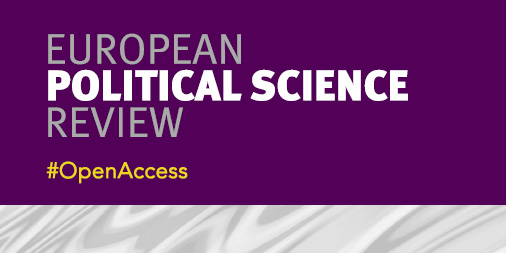
European Political Science Review
@epsrjournal
European Political Science Review (EPSR), an #OpenAccess journal for all.
Published by @ECPR and @CambridgeUP
ID: 119679411
http://cambridge.org/epsr 04-03-2010 09:44:16
4,4K Tweet
16,16K Followers
769 Following

📔Volume 17.2 🤝 Can participatory democracy become inclusive? Patricia García Espín argues that certain contextual factors and inclusion tools produce higher rates of #mobilisation and more egalitarian deliberations. 📖 bit.ly/3Cp49JR #OA 🔓



📔 Vol 17.2 🇪🇸 Are #GenZ pessimistic & populist? Alberto López Yagüe Piotr Zagórski - @pzag.bsky.social Juan Roch Gonzalez J Tudó-Cisquella & G Cordero analyse how pessimistic economic expectations in #Spain shape the preference for #populist parties among the young. 📖 bit.ly/3YzU5pU #OA


📔Vol 17.2 😷 Fighting collective threats Focusing on the role of socialism & the existence of long-term regime-driven legacies, Luis de la Calle investigates why some countries were more successful in containing the death toll than others during #Covid 📖 bit.ly/42sRkra #OA


📔 Vol 17. 🔒 The lockdown paradox Using data from 7 European countries 🌍, Nena (Ioana-Elena) Oana @[email protected], A Bojar & C Wang show that people with positive evaluations of their govt’s #Covid response are more likely to maintain support for the democratic system. 📖 bit.ly/3Crjf1l #OA


🆕 🚨Widespread, but also popular? How do people feel about diversity policies? 📊 Nicolas Fliess & Schönwälder explore public attitudes across Europe, revealing nuanced support and resistance towards diversity measures. 🔗ow.ly/YnL550VSqhL #OA #Diversity #PublicOpinion

🇨🇿 Heading to #ecprjs25? 👋Come and chat with two of our Editors Lisa Zanotti & Steven M. Van Hauwaert at the Welcome Reception.


🇨🇿 Going to be at #ecprjs25? Say hello 👋to T. Exadaktylos & Catherine Moury at the Welcome Reception.


🆕 What about elite manipulation in deliberative mini-publics? 🗣️ 🔍 Nino Junius investigates the Ostbelgien model, examining how vulnerable citizen assemblies are and see what makes them resilient. 👉 ow.ly/4oGW50VSrMv #OA #DeliberativeDemocracy #PoliticalScience

🆕 Participatory democracy and participatory research 🔄🗳️🔬 🧠 @HansAsenbaum, @Dr_Bussu, Citizen Participation - [email protected] & @clharris_ucc explore the how they can inform each other offering a new research agenda. 👉 ow.ly/v3Zu50VSrWC #OA #ParticipatoryDemocracy #ResearchMethods

📔 Vol 17.2 🇫🇷 Echoes from the trenches Using data that identifies & geolocates all 🪖 French soldiers who died during WWI, Vlad Surdea-Hernea examines the relationship b/w community-level exposure to war losses & long-term electoral behaviour. 📖 bit.ly/3NRRAcj #OA


📅TODAY at #ecprjs25 👋Meet Our Editors 🧡Lisa Zanotti & Steven M. Van Hauwaert 📙To find out more about submitting to & publishing in PRX


🌟 Greetings from #ecprjs25 🇨🇿 Meet our Editors today!📆 Ask T. Exadaktylos & Catherine Moury all about EPSR 💜

📔Vol 17.2 🇧🇪 Two worlds, one nation? Using an innovative methodology of class-specific multiple correspondence analysis, Daan Delespaul cecil meeusen Koen Abts & @swyngedouwm compare the political spaces of #Flanders and #Francophone #Belgium. 📖 bit.ly/3YkHaXL #OA


📔 Vol 17.2 🇮🇹 Term limits in parliament & electoral disconnection F Bromo, Paolo Gambacciani & Marco Improta examine the 5 Star Movement party in #Italy, which imposed a limit of 2 terms for affiliates seeking to gain or retain a parliamentary seat🪑. 📖 bit.ly/4fVaDyl #OA



🆕 🗳️ Does polarization drive political participation? A systematic review and meta-analysis by Marta Kołczyńska examines 25 studies since 1990 to find the impact of #Polarization on #Participation 🔗 ow.ly/yZSW50VZRga #OA

📔 Vol 17.2 🇪🇺 What determines women’s electoral success in the #EPelections? Aleksandra Polak & Marcin Lewandowski find that incumbency rates, party size, and ideological orientations all play a key role in shaping women’s #representation 🙋♀️. 📖 bit.ly/4itIjEs #OA





